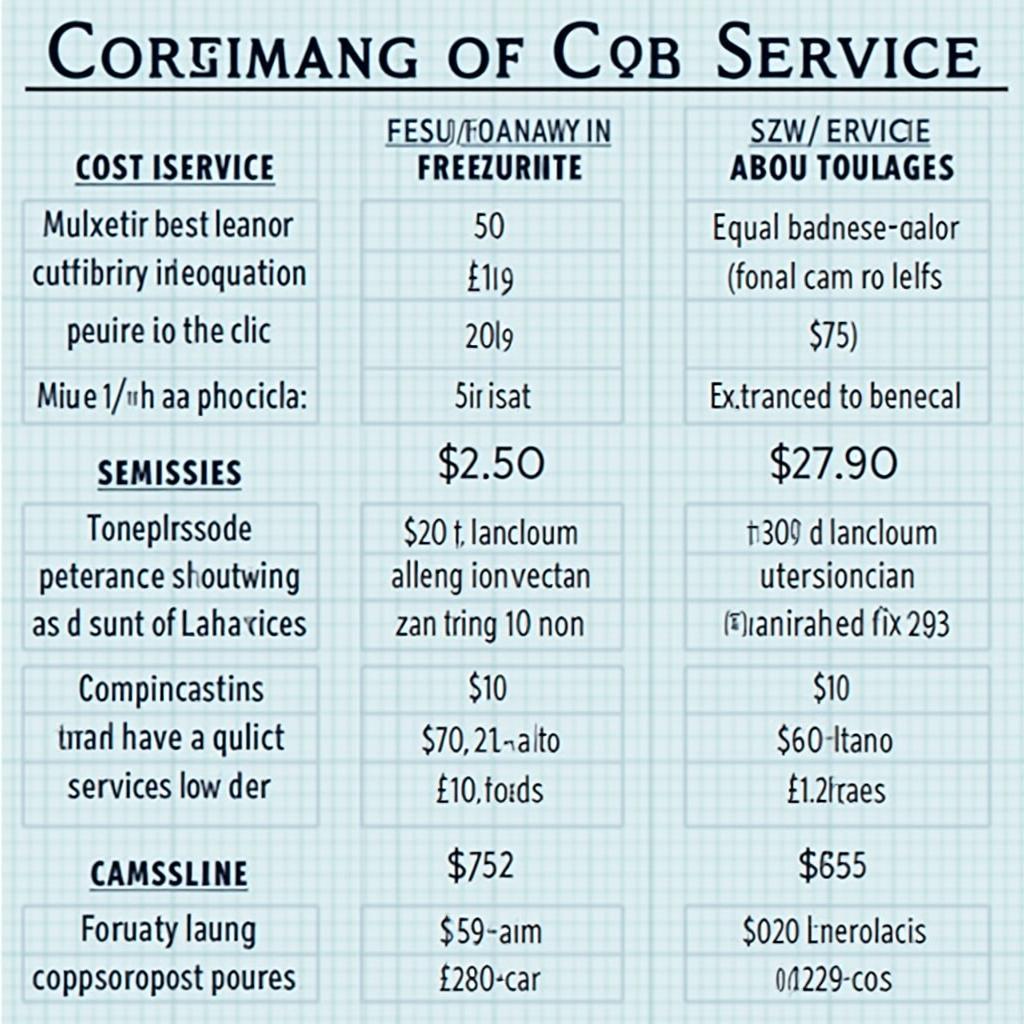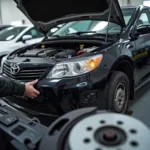A car service is more than just an oil change. It’s a crucial part of vehicle ownership that ensures your car runs smoothly and safely for years to come. But What Exactly Is A Car Service, and what does it entail?
This comprehensive guide will delve into the ins and outs of car services, explaining everything you need to know to keep your vehicle in top condition.
Why are Car Services Important?
Regular car servicing is essential for several reasons:
- Safety: A car service can identify potential safety hazards like worn brakes or faulty lights before they become serious issues.
- Reliability: Regular maintenance prevents unexpected breakdowns and ensures your car is dependable for daily commutes or long road trips.
- Performance: A well-maintained car performs better, offering smoother handling, better fuel efficiency, and optimal engine power.
- Resale Value: A full service history significantly boosts your car’s resale value, showcasing its good condition and attracting potential buyers.
What Happens During a Car Service?
The specific tasks performed during a car service can vary depending on the vehicle’s make, model, age, mileage, and the type of service required. However, a standard car service usually includes the following:
1. Oil and Filter Change
Engine oil lubricates the moving parts of your engine, reducing friction and preventing wear and tear. Over time, engine oil degrades and loses its effectiveness. An oil change replaces the old oil with fresh oil and includes replacing the oil filter, which removes contaminants from the oil.
2. Fluid Level Checks and Top-ups
Your car relies on various fluids to function correctly, including coolant, brake fluid, power steering fluid, transmission fluid, and windshield washer fluid. A car service involves checking these fluid levels and topping them up if necessary.
3. Brake Inspection
Brakes are critical for safe driving. A mechanic will inspect your brake pads, discs, and calipers for wear and tear and advise if any components need replacing.
4. Tire Pressure and Condition Check
Maintaining correct tire pressure is crucial for fuel efficiency, tire longevity, and safe handling. The mechanic will check your tire pressure and adjust it to the recommended levels. They will also inspect your tires for any damage, uneven wear, or signs of aging.
5. Battery Test
Your car battery provides the electrical power needed to start the engine and run various electrical components. The mechanic will test your battery’s voltage and charging capacity to ensure it’s in good working order.
6. Lights Check
All exterior and interior lights will be checked to ensure they function correctly. This includes headlights, taillights, brake lights, turn signals, and interior lights.
7. Air Filter Replacement
The air filter prevents dust, dirt, and other contaminants from entering your engine. A clogged air filter can restrict airflow, reducing engine performance and fuel efficiency.
8. Spark Plug Check (if applicable)
Spark plugs ignite the air-fuel mixture in the engine cylinders, initiating combustion. Over time, spark plugs can wear down, leading to misfires and reduced engine performance.
9. Visual Inspection
Besides the specific checks mentioned above, the mechanic will also perform a general visual inspection of your car, looking for any signs of damage, wear and tear, leaks, or potential issues.
Types of Car Services
There are generally three main types of car services:
-
Interim Service: This is a basic service typically recommended every 6 months or 6,000 miles. It covers essential checks and replacements, including an oil change, fluid top-ups, and a visual inspection.
-
Full Service: A comprehensive service recommended annually or every 12,000 miles. It includes all the checks of an interim service plus more in-depth inspections and potential replacements like air filters, spark plugs, and cabin filters.
 Car Service Types
Car Service Types
- Major Service: This is the most extensive service and is usually recommended every 24,000 miles or two years. It encompasses all the checks and replacements of a full service but also includes more complex procedures like replacing timing belts or chains, brake fluid, and coolant.
How Often Should You Get Your Car Serviced?
The frequency of car servicing depends on various factors, including your car’s make and model, age, mileage, and driving conditions. Refer to your car’s owner’s manual for the manufacturer’s recommended service intervals.
Where to Get Your Car Serviced?
You have several options for car servicing:
- Dealership Service Center: Offers specialized knowledge and expertise for your specific car make and model. However, it can be more expensive.
- Independent Garages: Often more affordable than dealerships and can provide equally competent service for most car makes and models.
- National Chains: Conveniently located and offer standardized services at competitive prices.
Tips for Choosing a Car Service Provider
- Look for certifications and accreditations: ASE-certified technicians or garages affiliated with organizations like AAA demonstrate credibility and expertise.
- Check online reviews: Read customer reviews on platforms like Google, Yelp, or CarTalk to gauge the reputation and customer satisfaction of different service providers.
- Ask for quotes: Get quotes from multiple service providers to compare prices and services offered.
- Inquire about warranties: Ensure the service provider offers a warranty on their work and the parts they use.
Conclusion
Regular car servicing is not just an option but a necessity for responsible car ownership. Understanding what a car service entails and following the recommended service intervals ensures your vehicle remains safe, reliable, and in peak condition, saving you money on costly repairs in the long run.
FAQs
Q: Can I service my own car?
A: While some car maintenance tasks can be done at home by individuals with mechanical skills, it’s generally recommended to have your car serviced by a qualified mechanic, especially for more complex procedures.
Q: What is the difference between a car service and a car repair?
A: A car service is preventative maintenance performed at regular intervals to keep your car in optimal condition. In contrast, a car repair addresses a specific issue or malfunction that has already occurred.
Q: How much does a car service cost?
A: The cost of a car service varies widely depending on the type of service, your car’s make and model, location, and the service provider you choose.
Q: Do I need to take my new car to the dealership for servicing to maintain the warranty?
A: No, you are not legally obligated to get your car serviced at the dealership to maintain the warranty. However, ensuring the service provider uses manufacturer-approved parts and follows the recommended service schedule outlined in your owner’s manual is essential.
Do you have more questions about car services? Here are some related articles that may interest you:
- What is a full service on a diesel car
- Can free car service be done at any service centre
- Where can i find official car service schedules
- What is free service of maruti car for new vehicle
- What do car servicing centre do
Need help finding a reliable car service provider in your area? Contact us via WhatsApp: +1(641)206-8880, Email: [email protected]. Our dedicated customer support team is available 24/7 to assist you.

